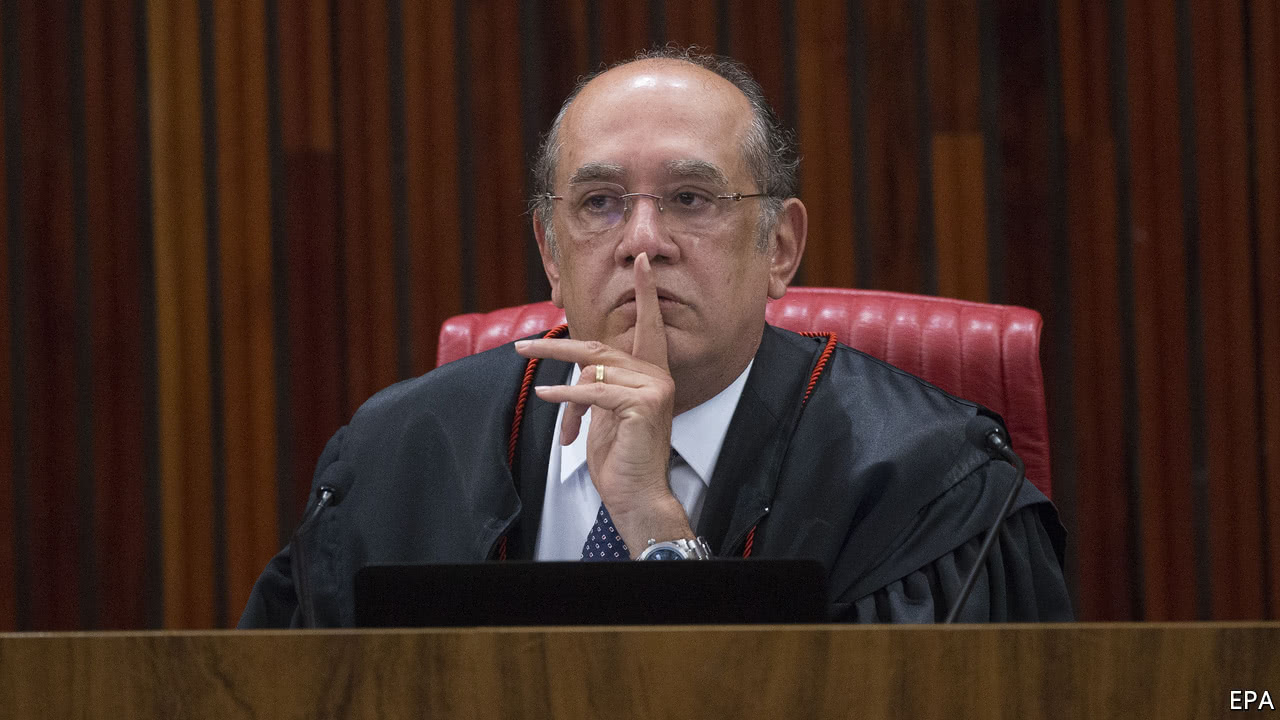
“YOU don’t remove a president whenever you please,” pronounced Gilmar Mendes, the top judge of Brazil’s supreme electoral tribunal (TSE) on June 9th as he voted to acquit Brazil’s president, Michel Temer, of charges of soliciting illegal campaign donations. With that tiebreaking vote, Mr Temer survived the biggest threat yet to his scandal-hit presidency. It is unlikely to be the last.
Mr Mendes sided with three other judges in dismissing as immaterial evidence amassed by prosecutors in a bribery investigation that has rocked Brazilian politics for the past three years. The decision also applies to Dilma Rousseff, who won the presidential election in 2014 with Mr Temer as her running mate, only to be impeached and replaced by him last year.
Two weeks ago it looked as if the tribunal would deliver a knockout blow to Mr Temer. On May 17th the supreme court authorised the chief prosecutor, Rodrigo Janot, to open an investigation after an audio recording emerged in which Mr Temer appeared to condone obstruction of the bribery investigations, known collectively as Lava Jato (Car Wash). Already unpopular, the president looked fatally weakened. Many analysts thought that the electoral-court judges, sensitive to politics because that is the substance of their work, would conclude that his continuation in office would further destabilise Brazil.
But Mr Temer’s reserves of strength were greater than his accusers had realised. He cast doubt on the validity of the tape, which proved less conclusive than prosecutors had suggested. Its quality is poor, and prosecutors had submitted it as evidence before forensic analysis. Mr Temer pointed out that his pro-market economic reforms are paying off: inflation is falling and the economy grew in the first quarter of 2017 after eight quarters of decline. Fewer Brazilians turned out to protest against Mr Temer than had against Ms Rousseff. Political parties decided not to abandon Mr Temer’s broad congressional coalition. The electoral court took note.
With the threat from the TSE gone, Mr Temer has a decent chance of completing his term, which ends in January 2019. Mr Janot is expected to file formal charges against him—for obstruction of justice, as well as for accepting bribes—based on the fateful tape and on testimony from Joesley Batista, a billionaire meat mogul who surreptitiously recorded it, and from Mr Batista’s brother. But for the case to proceed, two-thirds of deputies in the lower house of congress must consent. Mr Temer has enough hard-core support from his Party of the Brazilian Democratic Movement and a few others to block this. A dozen or so impeachment motions against him look doomed for the same reason.
Still, he remains vulnerable. Several of his chums are already in jail or could soon be. Rodrigo Loures, a former aide, was arrested after being filmed by police receiving 500,000 reais ($152,000) in cash from Mr Batista’s envoy. Geddel Vieira Lima, an ally of the president, and minister until he resigned last November in an influence-peddling imbroglio, is reportedly in the sights of the Lava Jato investigation. Mr Loures has not incriminated Mr Temer and Mr Vieira Lima remains at liberty. But, faced with the threat of serious jail time, either could talk. The more evidence mounts against Mr Temer, the more likely his congressional firewall is to collapse.
Mr Temer insists he is not worried, because he has done nothing wrong. He is pressing ahead with economic reforms, no doubt hoping they will boost confidence, which will in turn encourage Brazilians to forget about the accusations against him. Congress could introduce more flexible working hours and make firing and hiring easier as soon as this month. Legislators, however, will expect more pork-barrel spending in return for supporting reforms; Mr Temer may have to accept that. And they are likely to exploit his diminished standing to weaken his proposed pension reform, which is unpopular but vital for the Brazil’s long-term public finances.
The market-friendly Party of Brazilian Social Democracy (PSDB), Mr Temer’s main governing partner, might pull out of the coalition. But it has said it will back reforms even from the opposition benches. And with a budget deficit of 9% of GDP, the government cannot afford to spend much to induce congressmen to support its programme. There is though, a little to spare. Nascent economic growth is providing the treasury with a bit of extra cash. Brazil’s currency and stockmarket have weakened a bit, but not collapsed, suggesting they expect some version of the reforms to pass.
Brazil’s discredited political class is hoping that the TSE’s acquittal of Mr Temer and Ms Rousseff marks the beginning of the end of the judiciary’s ferocious pursuit of its leading figures. They portray Mr Janot’s failure to win a conviction as evidence that he and his fellow investigators have gone too far. They suggest that the prosecutor was grandstanding before his term expires in September, perhaps to ensure that Mr Temer nominates a successor who is equally zealous.
Some non-politicians, especially prosperous urbanites, are beginning to think that prosecutors rely too much on plea bargains and selective leaks. Editorials in Estado de São Paulo, a newspaper that reflects the views of the city’s elite, lambast Mr Janot for excessive zeal.
Such criticisms are not always wrong. The judges and prosecutors pursuing the Lava Jato investigations have on occasion acted too hastily and overstepped their powers. But the muck they have uncovered is real. The TSE’s ruling does not invalidate their findings. Brazilians are weary of scandal, but for the health of the country’s democracy they need the investigations to go on.
www.economist.com
No hay comentarios.:
Publicar un comentario